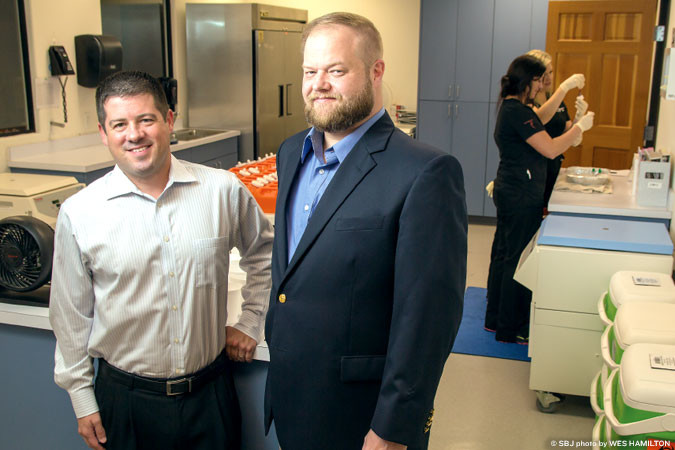YOUR BUSINESS AUTHORITY
Springfield, MO
YOUR BUSINESS AUTHORITY
Springfield, MO

At QPS Bio-Kinetic, study No. 17214 is seeking nonsmoking 18-45 year olds for a day of clinical research and one overnight stay. Each qualified participant receives $300 before clocking out. The tradeoff? Study participants apply a topical lotion for skin disorders to evaluate reactions at varying doses. Some call them human guinea pigs.
But there is money in it. Maybe not as lucrative as NASA’s $18,000 offering earlier this year for 70-day trials of zero-gravity conditions, yet QPS Bio-Kinetic is coming off a record month of $1 million in stipends awarded and a record year of revenues.
The clinical research-testing model has been replicated with 30,000 participants since Dale Bourg founded the Springfield company in 1994. Now a division of privately held Delaware-based QPS, the local, over 100-employee operation is the largest in the global research family with 240 Phase I clinical research beds.
Two decades of clinical testing payouts amount to $25 million in stipends locally, according to QPS Bio-Kinetic officials.
“Our goal besides bringing new drugs to market is to help the community out,” QPS Bio-Kinetic General Manager Mark Slama says of the economic impact of the stipends.
Tipping the scales to the million-dollar mark were three summerlong studies that paid out in September, Slama says, noting one was researching a new treatment for multiple sclerosis.
Pharmacy connections
There are two sides of the business: outward facing in agreements with pharmaceutical companies and inward facing with physicians and lab techs.
“All of our customers are from out of town,” Slama says, pointing to some 200 pharmaceutical companies QPS has worked with over the years.
QPS officials negotiate with pharmaceutical companies for pricing of various tests. Industry norms range from $25,000 for a couple of days to $5 million for months.
QPS research in Springfield has assisted bringing to market such products as Allegra, Mucinex and Advil, says Brendon Bourg, the founder’s son and senior director of budgeting and scheduling.
“We really don’t know when the next phone call is going to be an exciting new drug in development,” Bourg says.
Company officials say the research is regulated by the Food and Drug Administration, which periodically sends representatives unannounced.
“They show up on our doorstep and review all our data and interview us,” Slama says.
Study participants sign consent forms to cover the inherent risks in the research. Slama says most are negligible, involving urine samples and blood draws.
“That’s about invasive as we get,” he says. “You can’t ever say there is no risk involved, but we do our best to make it as safe as possible. If we weren’t, I don’t think we would have had 30,000 people who have done studies with us.”
One area of research QPS Bio-Kinetic won’t touch: first-in-human studies.
“We will never do a study in Springfield where the product has never touched another human first,” Slama says, leaving that controversial work for QPS labs in Miami and The Netherlands, as well as competing research companies. “We’re not engineered for that and it’s not the right fit in this conservative area of the country.”
Close-knit group
Last year was a banner year for QPS Bio-Kinetic, with revenue growing 70 percent to an undisclosed record. Typical revenue growth is 15-20 percent, Slama says.
While most of the work is confidential, Slama says QPS works with most major pharmaceutical companies. As a result, the jobs are affected by pharma’s recent merger bonanza. In the first half of the year, analysts tracked $220 billion in pharmaceutical deals, according to reporting by Fortune in July.
“Four of our clients merged in the last six months,” Slama says, citing deals involving Allergan.
Independent clinical research study labs are few. “It is a close-knit group of people that do pharmaceutical research,” Slama says, and as a result the work spans the globe. QPS’ recent MS study, for instance, is for a European client. “We travel all over the world to demonstrate our capabilities.”
While most studies have 24-120 participants, next year the company plans to match its largest trial with 2,000 participants.
“That’s for a company trying to develop a drug for (a rare disease) that kills babies around the world – not a lot but it does,” Slama says, noting both the size sample and the potential impact are unique. “Not all are as exciting as that one, where you can actually save people’s lives. You feel like you’ve made an important addition to the society.”
On average, QPS works with 30-50 sponsoring companies. On some occasions, QPS data bear bad news for its clients.
“Some companies don’t make it. A lot get into this business and their product doesn’t work out,” Slama says. “We do have to tell clients that their drug doesn’t work.”
Moseley’s Discount Office Products was purchased; Side Chick opened in Branson; and the Springfield franchise store of NoBaked Cookie Dough changed ownership.